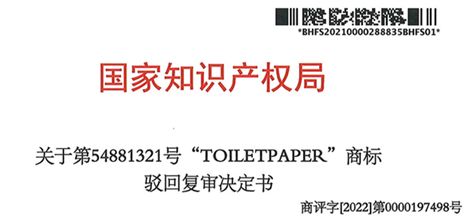The present article touches the topic of refusal of registration issued by the Chinese Trademark Office (CNIPA) on the basis of lack of distinctiveness (art. 10 Chinese Trademark Law – "TML").
In recent times we are indeed experiencing an increase in provisional refusals of trademarks that are not only based on the usual ground of art. 30 TML (prior similar trademarks), but they are based on lack of distinctiveness (art. 10 TML).
This is the case - for example - of "TOILETPAPER".
Founded in 2010, - as reads on the official website - TOILETPAPER is an artist's magazine created and produced by Maurizio Cattelan, a leading figure in international contemporary art known for his fondness for humor and provocation, and Pierpaolo Ferrari, famous photographer and artistic director. Since the first issue of TOILETPAPAER was published in 2010, Cattelan and Ferrari have created a quirky and audacious universe where ambiguous stories and disturbing imagination are presented, combining commercial photography with a surrealist visual approach. Inspired by a popular culture, the world of advertising, religious iconography and art history. TOILETPAPER investigates the current phenomenon of hyper consumption of images, all with a delicious dose of irony.
Nowadays TOILETPAPER organizes art exhibitions and artistic events, but has also developed an interesting collection of lifestyle objects that are sold via the website and in retail stores worldwide.
As any operator doing business in China the company approached us and appointed HFG for the trademark registration in China. Clearance done; we optimistically filed the trademark in 2021 designating several classes in relation to lifestyle products. Unfortunately, the trademark application was all rejected due to lack of distinctiveness.
Well, why lack of distinctiveness?
"Toilet paper / hygienic paper" (in Chinese: 卫生纸) is listed Nice Classification and in the Chinese classification in class 16, sub-class 1603, basic number 160094. See here.
I do agree that if someone attempt to register TOILETPAPER for distinguishing the product "toilet paper / hygienic paper" the trademark is not assolving its distinctive function and shall not be registered.
However, in the present case the trademark is not use for that kind of hygienic paper used in the toilet to accomplish post-event cleaning activity, thus we don't understand what kind of lack of distinctiveness the examiner saw missing. We did not designate class 16 and any product in relation to that hygienic toilet paper. We filed the trademark in classes 18, 20, 21, 27 and 35 (lifestyle objects).
Optimistically, we then made appeal and explained the usage of the trademark (art magazine, art events and artistic lifestyle objects) and that the lack of distinctiveness cannot simply derive from the fact that the words chosen as trademark have a meaning in English language. This is simply against the most basic principles of trademark law.

Herein the reasoning from CNIPA-TRAB:
The applicant has filed many pieces of evidences such as brochures, relevant reports, outdoor displays, official websites, licensing agreements, orders, sales invoices, customs declarations, relevant search results, trademark registration information in foreign countries, etc.
After appeal, the CNIPA held that the applied trademark being used on designated goods cannot distinguish the origin of goods, and lacking distinctiveness as a trademark. Thus, the applied trademark has constituted the situation prescribed by Article 10.1.3 of the Trademark Law.
We tend to believe that the Trademark Office is flooded with millions of trademark applications and the judgement of the examiners is currently very severe not only on the similarity with prior trademarks but also on the absolute ground, such as the lack of distinctiveness and/or the misleading effect.
However, we tend to - respectfully but firmly - disagree with their decision in considering TOILETPAPER lacking distinctiveness in relation to art magazine and lifestyle goods.
The content of this article is intended to provide a general guide to the subject matter. Specialist advice should be sought about your specific circumstances.

